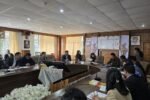HT Correspondent
TAWANG, July 16: In a significant move aimed at enhancing the visitor experience while promoting sustainable tourism, Deputy Commissioner of Tawang, Namgyal Angmo, IAS, held a preliminary meeting with key tourism stakeholders at her office chamber recently.
According to an official statement, the meeting brought together representatives from the Department of Tourism, Tawang Monastery, village heads, members of the local tourism industry, and the Hoteliers Association of Tawang.
The primary focus was to deliberate strategies for improving tourist services while safeguarding the ecological and cultural integrity of Tawang’s most visited destinations.
Among the proposals discussed was the introduction of a regulated ticketing system for popular tourist sites including Tawang Monastery, Bumla Pass, Jhongatser Lake, Chumig Gyatse (Holy Waterfall), and Chagzam.
The initiative, the Deputy Commissioner said, is being developed in consultation with local communities to ensure transparency and participation.
DC Angmo emphasised that the proposed system aims to strike a balance between tourism and sustainability.
“With the growing number of visitors to Tawang, it is vital for us to develop a system that supports maintenance and generates modest revenue, while protecting our natural and cultural heritage,” she said.
Under the proposed model, funds collected through ticketing would be primarily used by the respective local communities for maintenance of the sites.
A portion would also go towards supporting district-level waste management efforts to keep tourist locations clean and well-preserved.
Representatives from several villages, including Rho, Jangda, Mogto, Gomkyaleng, and Mirba, as well as Secretaries of Tawang Monastery, attended the meeting.
They were urged to discuss the proposal with their communities and submit feedback within two weeks to aid in finalising the framework.
Members of the Hoteliers Association and the District Tourism Officer also contributed their suggestions, expressing unanimous support for a coordinated and community-driven tourism strategy.
The district administration has stated that it is committed to building a tourism model that not only improves visitor experience but also ensures long-term benefits for local residents and protection of Tawang’s rich environmental and cultural assets.












